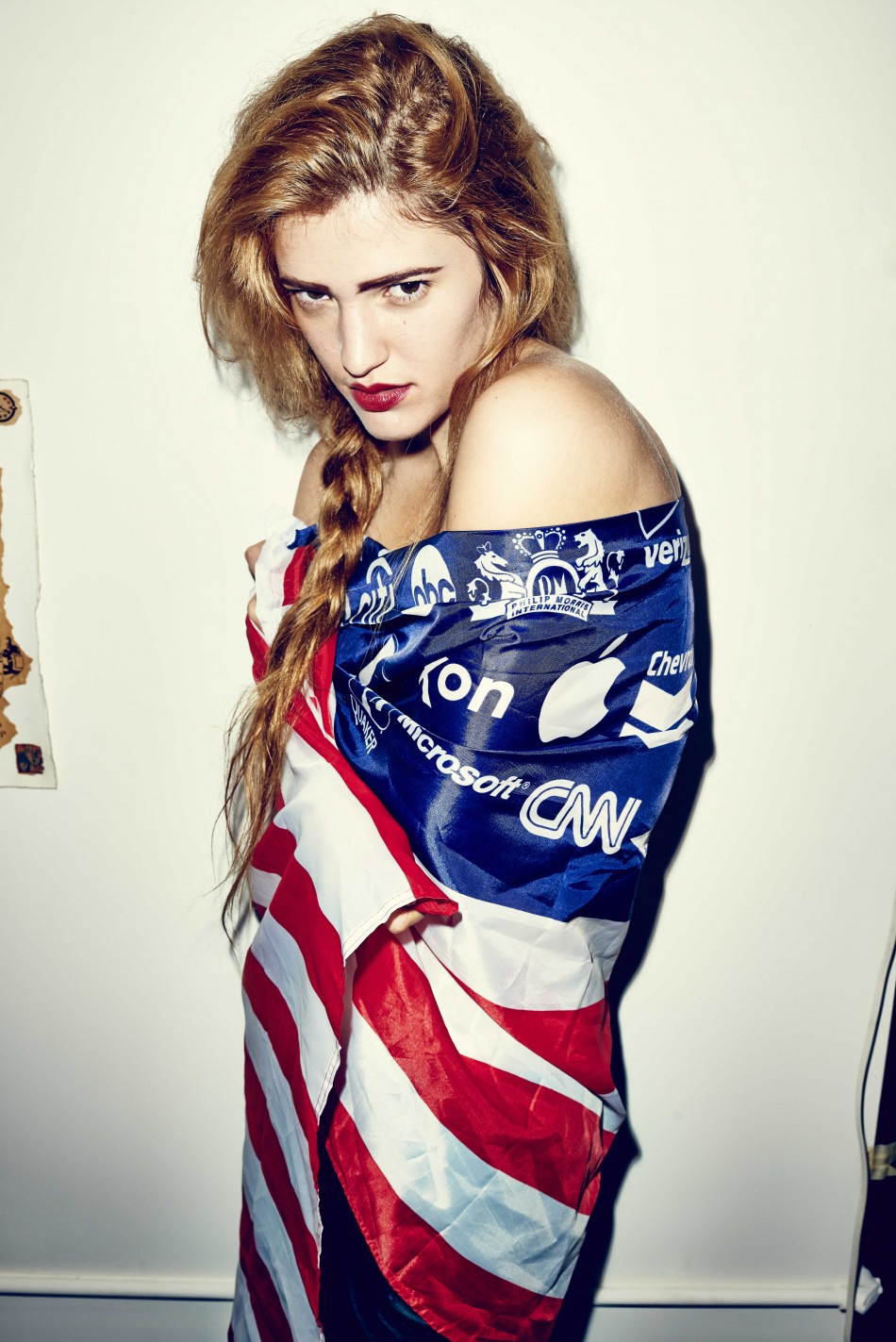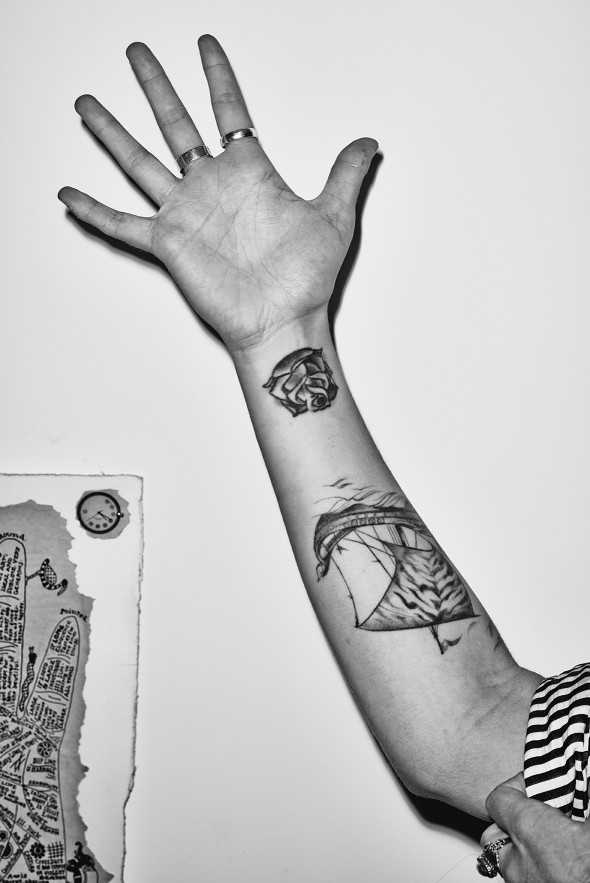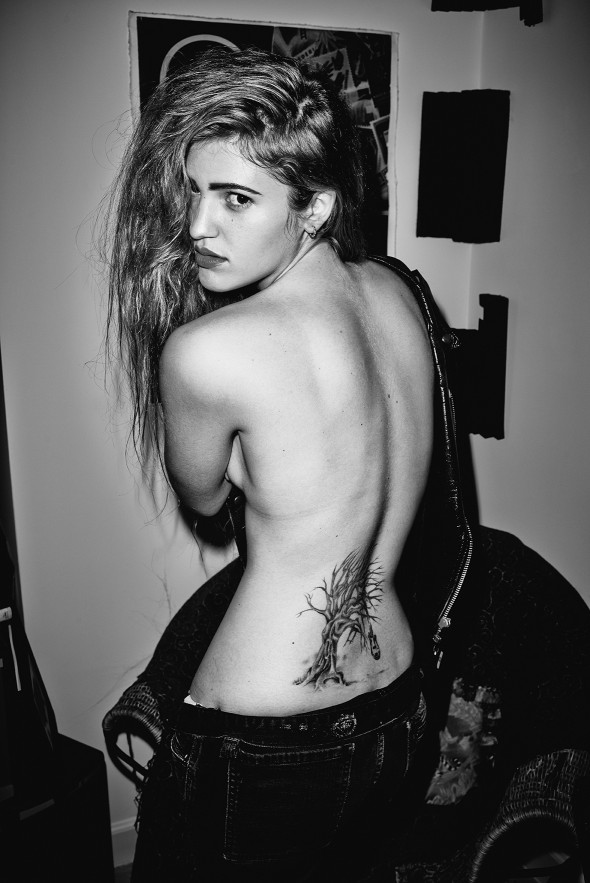
Depending who you speak with, she may be the front woman in a heavy rock band, a writer for several magazines and blogs, studio manager and tech aficionado, or organizer of political rallies. Yet, one thing Eleanor Goldfield is not is apathetic. Having witnessed the social juxtapositions of growing up in both Sweden and North Carolina and inspired by her socially conscious parents to stand up for what you believe, Goldfield has an insatiable drive to use her voice to challenge political corruption and social inequalities. In 2010, with friend and fellow musician Brian Marshak, Goldfield formed the band Rooftop Revolutionaries as a way to express social and political messages against the sound of hard, driving rock music. Young and refreshingly honest with her beliefs, Goldfield’s skill at blending activism with art is instrumental in reopening a much-needed social dialogue. In between appearing on Breaking the Set with Abby Martin, filming her music video for Folk Devils from their album RESOLUTE, and spreading the word of socio-political cognizance, we spoke to Goldfield from her home in Los Angeles about what drives her, what we can expect to see, and how she deals with nay-sayers.
As an individual, are you first and foremost activist or artist?
At this point, they are linked. It’s not that black and white, however. There are a couple of RR songs that deal with the human condition in a more introverted philosophical context, more focused on personal evolution. While this is not an over-arching political point, it is impossible to affect change in the world around you without first evolving to affect change in ourselves. I also work with activist projects outside of a purely artistic scope. I will give speeches in a more academic setting, or help organize and plan events based on my managerial experience.
The two are linked insofar as this combination is my primary focus, combining my two passions into one goal: Art Killing Apathy. As an artist, I feel it is my obligation to forward a message of substance, that touches upon the issues that we as human beings find ourselves dealing with. Artists are the voice of a generation. Do something with that voice.

How does your concept of Creative Activism differ from other means of socio-political activism?
A lot of people argue that they aren’t involved in politics because it’s boring, and in some cases, I can relate. Truth and knowledge are the catalysts to forward progress, but that doesn’t mean that you can’t deliver them in an entertaining and engaging way. This also touches upon the fact that people from my generation need to be the messengers. I love Noam Chomsky, but it leaves more of an impression if the person up there can relate to you on more than a basic human level. I’m your age; my future is this economy, this broken system. I can’t find work either, I have college debt, I wasn’t a part of the golden era, etc.
Activism needs to mesh with popular culture. No significant socio-political change has ever occurred without the engagement of popular culture. We need to be engaged, and creative activism is a way to bring politics and popular culture together.
With Rooftop Revolutionaries, why is it important for you to deliver thought-provoking and socially conscious lyrics, especially in a time when popular music often lacks depth?
Artists are the voice of a generation. Right now, that voice is saying “Don’t Stop the Party.” Is that what we want our legacy to be? I don’t. And I don’t think any self-respecting artist wants their stamp on humanity to be an ass-shake. So, because the current music industry lacks depth, it is even more important to put out substantive material that not only goes against the light, fluffy sounds of today, but that also goes against preaching escapism and ignoring reality. You’ve got one life, for fuck’s sake—pay attention!


As an outspoken activist, what types of resistance have you encountered and do you believe those opinions can be changed?
Any opinion can change and waver; the truth does not. It takes work from sides, the resistor and the activist. As an activist, I am always open for intellectual discourse. I have been proven wrong; that’s how I’ve grown, that’s how I’ve learned the truth about issues I didn’t know about before. It’s about using the right angle and the right delivery.
As far as encountering resistance, absolutely. The two most common arguments I hear are “I don’t have the energy to get into that mess,” and “Politics has nothing to do with me.” Starting with the first, it can be overwhelming, so start small. I’m not asking people to read ten news outlets when they wake up in the morning. Do a small amount of research and find something you can relate to, something that engages and intrigues you. Lee Camp, for example, is a great comedian who does 5-10 minute weekly rants on current issues. He’s hilarious, intellectual and incredibly engaging.
As for the second argument: bullshit. Have you ever gone to school? Have you ever taken a bus, train, airplane? Have you ever used a bridge or a road? Have you ever eaten vegetables labelled organic, or not labelled organic? In other words, absolutely everything you do in your day traces back to policy. Whether or not you are engaged, these policies will pass. Your silence is ever more deafening than any opinion. What happens in this country every day affects you. You can’t escape that, so you may as well pay attention and decide for yourself how you feel about it.
For individuals who also believe the political framework is flawed, but don’t know what they can do, can you offer any suggestions?
Get creative. If you’re a teacher, pass on your ideas and your concerns to kids in your class. Get them talking about it. If you’re a line chef, organize a local cook-out supporting organic, local produce—Monsanto will hate you for that! If you’re a receptionist, wear a political shirt so everyone walking in sees it. These are small changes,small actions—but that’s what activism is. It’s about standing up for what you believe in and pushing for change. Start small and grow. This country wasn’t built in a day and it won’t change in one, but like Newton said, it won’t change at all unless we start pushing.
What can we expect to see from you in the next five years?
In the next five years, expect to see an ever-increasing escalation in the visibility of the band and the message. From collaborating with other socio-political artists in videos, documentaries, visual art, writing. Expect to see it spread geographically as well: tours, terrestrial radio, and publications.

